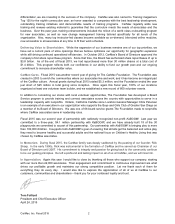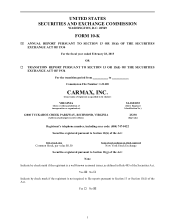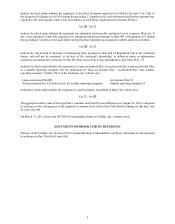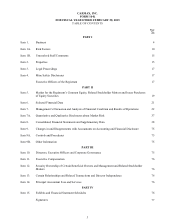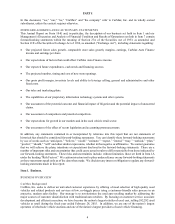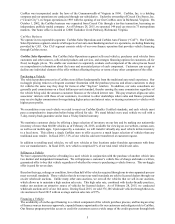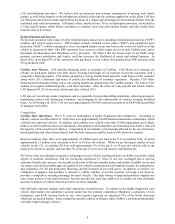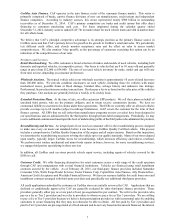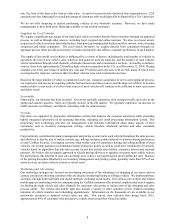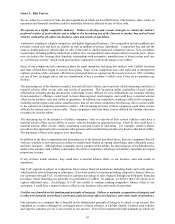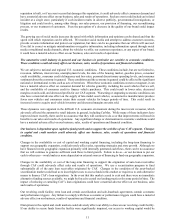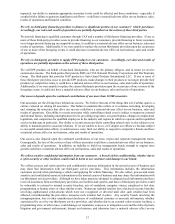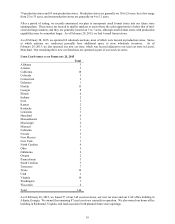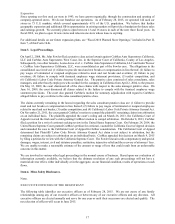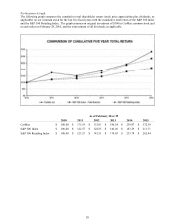CarMax 2015 Annual Report Download - page 14
Download and view the complete annual report
Please find page 14 of the 2015 CarMax annual report below. You can navigate through the pages in the report by either clicking on the pages listed below, or by using the keyword search tool below to find specific information within the annual report.10
Item 1A. Risk Factors.
We are subject to a variety of risks, the most significant of which are described below. Our business, sales, results of
operations and financial condition could be materially adversely affected by any of these risks.
We operate in a highly competitive industry. Failure to develop and execute strategies to remain the nation’s
preferred retailer of used vehicles and to adapt to the increasing use of the Internet to market, buy and sell used
vehicles could adversely affect our business, sales and results of operations.
Automotive retailing is a highly competitive and highly fragmented business. Our competition includes publicly and
privately owned new and used car dealers, as well as millions of private individuals. Competitors buy and sell the
same or similar makes of vehicles that we offer in the same or similar markets at competitive prices. New car dealers
in particular, including publicly-traded auto retailers, have increased their sales of used vehicles in recent years. These
new car dealers also leverage their franchise relationships with automotive manufacturers to brand certain used cars
as “certified pre-owned,” which could provide those competitors with an advantage over CarMax.
Some of our competitors have announced plans for rapid expansion, including into markets with CarMax locations
and some of them have begun to execute those plans. Some of our competitors have also replicated or attempted to
replicate portions of the consumer offer that we pioneered when we opened our first used car store in 1993, including
our use of low, no-haggle prices and our commitment to buy a customer’s vehicle even if they do not purchase one
from us.
The increasing use of the Internet to market, buy and sell used vehicles and to provide vehicle financing could have a
material adverse effect on our sales and results of operations. The increasing online availability of used vehicle
information, including pricing information, could make it more difficult for us to differentiate our customer offering
from competitors’ offerings, could result in lower-than-expected retail margins, and could have a material adverse
effect on our business, sales and results of operations. In addition, our competitive standing is affected by companies,
including search engines and online classified sites, that are not direct competitors but that may direct on-line traffic
to the websites of competing automotive retailers. The increasing activities of these companies could make it more
difficult for carmax.com to attract traffic. These companies could also make it more difficult for CarMax otherwise
to market its vehicles online.
The increasing use of the Internet to facilitate consumers’ sales or trade-ins of their current vehicles could have a
material adverse effect on our ability to source vehicles through our appraisal process, which in turn could have a
material adverse effect on our vehicle acquisition costs and results of operations. For example, certain websites
provide on-line appraisal tools to consumers that generate offers and facilitate purchases by dealers other than CarMax.
The popularity of these tools appears to be increasing.
In addition to the direct competition and increasing use of the Internet described above, there are companies that sell
software solutions to new and used car dealers to enable those dealers to, among other things, more efficiently source
and price inventory. Although these companies do not compete with CarMax, the increasing use of such products by
dealers who compete with CarMax could reduce the relative competitive advantage of CarMax’s internally developed
proprietary systems.
If any of these trends continue, they could have a material adverse effect on our business, sales and results of
operations.
Our CAF segment is subject to competition from various financial institutions, including banks and credit unions,
which provide vehicle financing to consumers. If we were unable to continue providing competitive finance offers to
our customers through CAF, it could result in a greater percentage of sales financed through our third-party financing
providers, which financings are generally less profitable to CarMax. In addition, we believe that CAF allows us to
capture additional sales. Accordingly, if CAF was unable to continue making competitive finance offers to our
customers, it could have a material adverse effect on our business, sales and results of operations.
CarMax was founded on the fundamental principle of integrity. Failure to maintain a reputation of integrity and
to otherwise maintain and enhance our brand could adversely affect our business, sales and results of operations.
Our reputation as a company that is founded on the fundamental principle of integrity is critical to our success. Our
reputation as a retailer offering low, no-haggle prices, a broad selection of CarMax Quality Certified used vehicles
and superior customer service is also critical to our success. If we fail to maintain the high standards on which our


